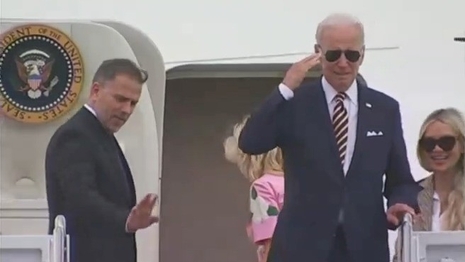N ew York magazine, which rarely missed a chance to rake President Trump across the coals, has a surprising cover story titled “The Sordid Saga of Hunter Biden's Laptop - And Why It Still Matters.” It’s written by Andrew Rice and Olivia Nuzzi. Will it become the latest example of Hunter Biden coverage the "mainstream" media ignores?
ew York magazine, which rarely missed a chance to rake President Trump across the coals, has a surprising cover story titled “The Sordid Saga of Hunter Biden's Laptop - And Why It Still Matters.” It’s written by Andrew Rice and Olivia Nuzzi. Will it become the latest example of Hunter Biden coverage the "mainstream" media ignores?
In his Fourth Watch newsletter, Steve Krakauer called the story “exhaustive and meticulous,” then added:
I wonder how many readers of New York magazine still believed the story was "Russian disinformation," as the intel community asserted at the time, and much of the media parroted (the part in the piece where James Clapper and Michael Hayden were pushed on their involvement in the "Russia" BS was fantastic). How many people have missed the bits and pieces of reporting by The Washington Post, CNN and others more than 18 months later that have verified the laptop, and still think it was fake because of how the story was handled in October 2020?
Rice and Nuzzi’s juiciest part for us is the media’s pro-Biden bias:
The nation’s most influential media institutions approached the sordid matter with grave skepticism. In a note to the Washington bureau the day the Post story ran, Times editor Elisabeth Bumiller wrote: “Hey all, let’s please refrain from tweeting about the story while we’re reporting it out. Thanks very much.”
“It was as though because the Times had not reported it, it did not exist,” says a former Times staffer. “There’s a whole category of story where conservative media covers it — sometimes sloppily — and then mainstream media institutions treat the whole area as radioactive and just won’t cover it, just surrender the subject matter entirely.”
A reporter for a major television network defended the impulse. “If you were a New York Times reporter, let’s say, or a CNN reporter, and you’re looking at it, there are a million red flags. It was a thorny story to report out,” this person said.
Sure, and it was a few weeks before Election Day, and only one side of the "October Surprise" is any fun.
Krakauer talked to Nuzzi about reporting the story over the last six months. Nuzzi said "I was most interested in the media angle - the way the press treated the story as toxic at the time. "I wanted to interrogate the groupthink. A conspiracy of silence is, I guess by definition, almost invisible if it’s effective....self interest and a lack of intellectual courage seemed to come together to form what amounted to an industry-wide posture towards a subject," she said. "I thought it was a dereliction of duty on the part of the mainstream press and also just super lame that such an account did not exist and I was eager to team up with Andrew to take on the assignment ourselves."
"We knew and were motivated by the fact that anyone outside of the conservative media was operating in a total information deficit," she told Krakauer. "You can’t form an opinion about something when you don’t know what that something even really is. People in the mainstream media refer to the right wing media 'bubble' a lot. And have for some time. But on this story, the mainstream media was in its own bubble."




